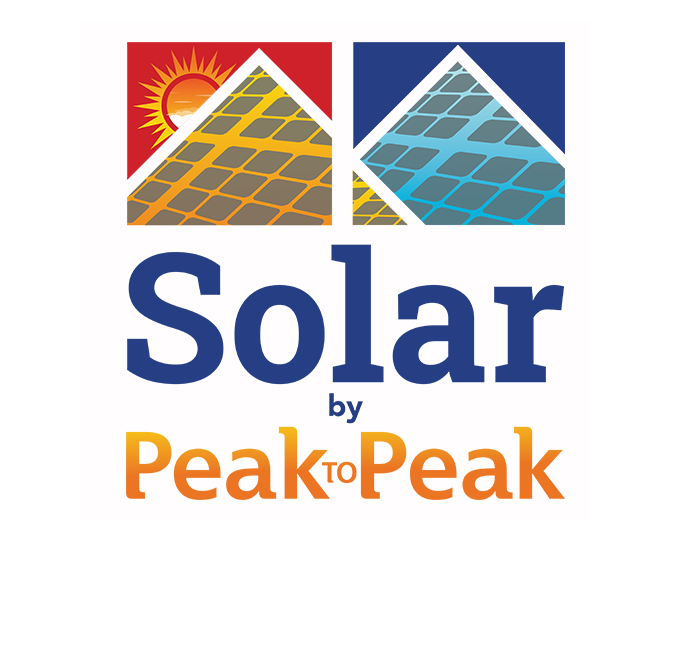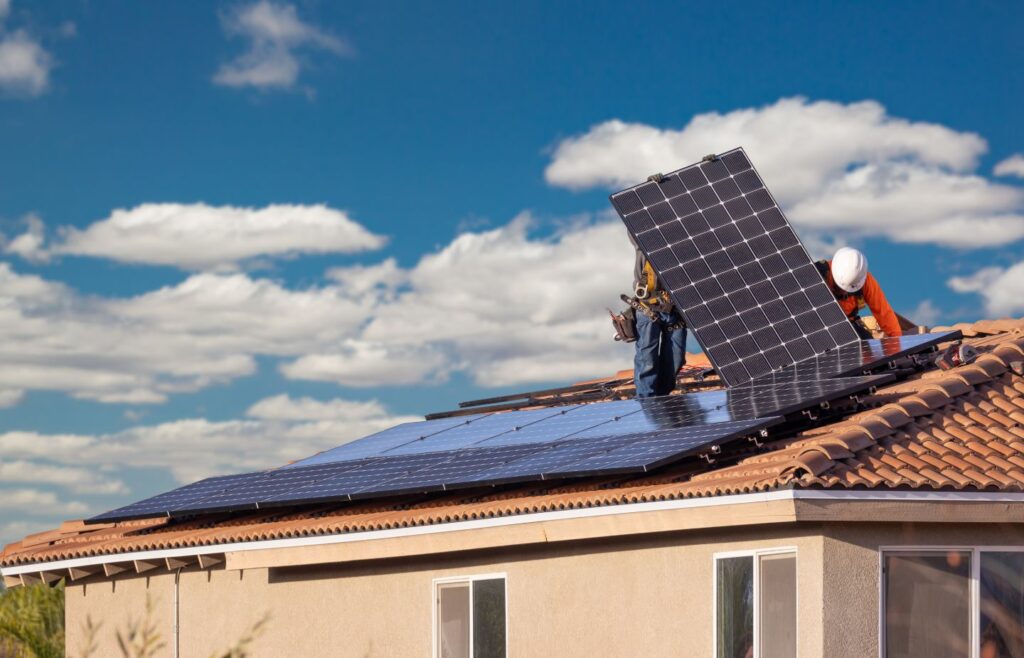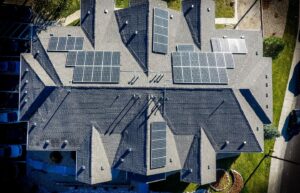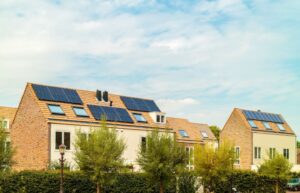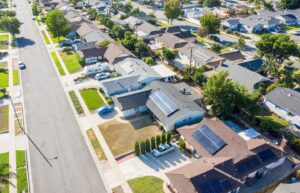Colorado’s diverse climate, ranging from arid deserts to snow-capped mountains, presents unique challenges and opportunities for harnessing solar energy. In this context, the importance of solar efficiency cannot be overstated, especially as we grapple with the urgent need to mitigate climate change.
For years, Solar by Peak to Peak has been a beacon of sustainable energy in the Denver metro area, proudly illuminating the path toward a greener future. As one of the foremost solar installers in Colorado, we have steadfastly committed ourselves to providing comprehensive solar solutions tailored to the unique needs of our diverse climate.
Join us as we delve into the intricacies of maximizing solar efficiency amidst Colorado’s diverse climate landscape with Solar by Peak to Peak.
Solar Efficiency Basics
Efficiency Factors
Silicon remains the dominant material in solar panel manufacturing. Its ability to convert sunlight into electricity efficiently makes it a top choice. However, newer materials like perovskite are showing promise for even higher efficiency rates.
Solar panel design plays a crucial role in maximizing sunlight absorption. Panels with anti-reflective coatings and textured surfaces grab more sun rays. This design tweak significantly boosts their power output.
The inverter, which converts solar energy into usable electricity, also affects system performance. High-efficiency inverters ensure less energy is lost during this conversion process. Thus, they play a vital role in the overall effectiveness of solar systems.
Climate Impact
In Denver, CO, extreme temperatures can both help and hinder solar panel efficiency. Cold, sunny days often see a spike in performance. Yet, extreme heat can reduce efficiency as panels overheat.
Humidity, along with factors such as water content in the air, has a lesser-known impact on solar energy production. High humidity levels can scatter sunlight, slightly reducing the energy that panels can capture.
This factor can be influenced by the local climate, with areas experiencing higher humidity potentially seeing a slight decrease in solar energy output compared to drier regions.
Cloud cover naturally reduces solar output by blocking direct sunlight. However, modern panels can still generate electricity on cloudy days, just at lower levels.
Technological Advances
Recent advancements in photovoltaic cell technology have led to more efficient energy conversion. These improvements mean that panels can produce more power from the same amount of sunlight.
Emerging materials like perovskite offer the potential for even greater efficiency gains. They could revolutionize how effectively panels convert sunlight into electricity.
Solar tracking systems have also seen significant innovations. These systems adjust the angle of the panels throughout the day to maximize sun exposure. This technology ensures that panels operate at optimal efficiency for longer periods of time.
Colorado’s Climate Challenges
Seasonal Variations
In the Centennial State, the sun’s position significantly impacts solar energy production year-round. During the winter, shorter days and a lower sun angle reduce the amount of available sunlight. Conversely, summer offers longer days with more direct sunlight, boosting solar efficiency.
To optimize solar panel performance in Denver, CO, homeowners can adjust the tilt of their panels seasonally. Understanding local weather patterns is crucial for effective solar planning. It ensures systems are designed to maximize sunlight capture throughout the year.
Snowy Conditions
Snow Removal
Snow accumulation can severely impact solar efficiency by blocking sunlight from reaching the panels. Safe removal methods include using specialized snow rakes or brushes designed not to damage the panels’ surface.
Some technologies automatically detect and melt snow, maintaining optimal operation even during heavy snowfall.
Panel Angle
The optimal panel angle varies with geographic location but aims to maximize solar absorption year-round. In Colorado, adjustable mounting systems allow for seasonal angle adjustments, enhancing efficiency. The ideal tilt considers both latitude and seasonal sun paths to ensure maximum exposure.
High-Altitude Effects
Colorado’s high altitudes offer a unique advantage for solar installations—the thinner atmosphere allows more sunlight to reach the panels directly, enhancing efficiency. However, mountainous regions pose installation challenges due to rugged terrain and variable weather conditions.
Solutions include specialized mounting systems that can withstand harsh environments and optimize panel orientation for increased energy production at higher elevations.
Solar Energy Storage Solutions
Storage Basics
Solar batteries play a crucial role in energy storage systems, capturing excess electricity generated during peak sunlight hours for later use.
There are various types of solar storage technologies, including lithium-ion and lead-acid batteries, each with unique applications and efficiency levels.
When sizing a solar storage system, it’s vital to consider the household’s energy needs, ensuring the system can handle daily consumption and potential energy spikes.
Selecting Systems
Capacity Needs
To calculate your energy consumption, start by reviewing past electricity bills or using an online calculator. Assessing peak energy usage times is also critical, as this will determine the capacity needed to avoid power shortages. For future-proofing, consider scalable solutions that allow for easy expansion as energy needs grow.
Budget Considerations
The initial investment in solar storage might seem steep, but the long-term savings on electricity bills can be significant. Many financing options exist, from loans to leasing programs, making solar more accessible.
Opting for higher-efficiency panels may have a higher upfront cost but can offer better long-term savings due to their increased output.
Benefits of Storage
Solar storage systems significantly enhance energy independence, reducing reliance on the electric grid. They prove especially beneficial in managing supply during peak demand periods or outages.
Moreover, integrating storage with solar installations greatly reduces carbon footprints, aligning with Colorado’s efforts to combat climate challenges through renewable energy adoption.
Installation and Maintenance Best Practices
Professional Installation
Hiring certified solar installers comes with significant benefits. These professionals ensure your system is optimized for your home’s specific needs. They conduct detailed assessments to design the most efficient setup possible. This approach not only maximizes energy production but also extends the lifespan of your solar panels.
Professional installers also offer warranties and service agreements. These can cover everything from minor repairs to complete system replacements, providing peace of mind over the long term.
DIY Considerations
While taking on a solar installation project yourself might seem appealing, it carries several risks. The challenges include potential safety hazards and the risk of installing an inefficient system. Successful DIY solar projects require meticulous planning and extensive research.
There are numerous resources available for those determined to go the DIY route. Online forums, instructional videos, and specialized tools can guide you through the process. However, understanding the complexity and time investment required is crucial before embarking on this journey.
Maintenance Tips
Regular cleaning and inspection are key to maintaining solar panel efficiency. Dust, leaves, and other debris can significantly reduce their performance if not cleaned off regularly.
Monitoring your system’s performance is vital for the early detection of any issues. Seasonal maintenance practices help keep your solar panels at peak efficiency throughout the year. For instance, ensuring they’re free from snow in winter or adjusting angles seasonally can make a big difference in output.
Maximizing Efficiency in Specific Areas
Boulder’s Snowy Roofs
In places like Boulder, snow can pose a significant challenge for solar panels. The weight of the snow can damage panels and decrease their efficiency. However, solutions exist. One approach involves installing panels at steeper angles. This helps snow slide off more easily, keeping the panels clear.
A notable example is a Boulder community project where solar arrays were designed with enhanced tilt mechanisms. These adjustments allowed for optimal sun exposure and minimized snow accumulation.
The project demonstrated that, with careful planning, solar energy is viable in snowy climates. It also showed the importance of considering snow load in system design to prevent damage and maintain efficiency.
Urban vs. Rural Settings
Solar installations face different challenges and advantages in urban and rural settings. In cities, space is scarce, but electricity demand is high. This makes rooftop solar installations particularly valuable. They not only provide power but also reduce heat islands in dense areas.
Rural areas offer more space for ground-mounted solar farms, which can generate significant amounts of electricity. However, these settings often face higher installation costs due to their remote locations.
Innovative urban solutions include building-integrated photovoltaics (BIPV). These systems incorporate solar cells directly into building materials like windows or facades. BIPV represents a promising way to blend solar technology into cityscapes without needing extra space.
Both environments show that regardless of the setting, there are ways to maximize solar efficiency with thoughtful design and technological adaptation.
The Future of Solar in Colorado
Technological Innovations
In the quest for maximizing solar efficiency, researchers and companies are pushing boundaries with cutting-edge technologies.
These include advancements like bifacial solar panels that capture sunlight from both sides and thin-film solar cells, which are lighter and more flexible than traditional models. Such innovations promise to boost the power output of solar installations significantly.
The potential impact is vast. With these technologies, Colorado could see a dramatic increase in its solar energy capacity, making renewable power more accessible than ever.
Partnerships between universities and private firms are at the heart of this progress, driving solar technology forward through shared expertise and resources.
Policy Changes
In recent years, pivotal policy changes have been witnessed that shape the future of solar energy in Colorado. The state government has introduced incentives for solar panel installation and mandates for renewable energy adoption. These efforts aim to make Colorado a leader in green energy.
The role of the government is crucial here. By enacting supportive legislation, it not only promotes renewable energy but also attracts investment into the sector. Furthermore, Colorado’s commitment to international agreements on climate change emphasizes its dedication to expanding solar energy usage.
This global perspective ensures that the state’s policies align with broader efforts to combat environmental challenges.
Discover Solar by Peak to Peak – Tailored Solutions for Colorado’s Diverse Solar Landscape!
Solar by Peak to Peak stands out as Denver, Colorado’s premier solar installer. We have built a reputation for excellence over the years. Our team understands the unique solar needs of this region.
We tailor our solutions to each customer, ensuring they get the most efficient system. This approach has made us leaders in solar installation across Denver and beyond.
Versatile Offerings
Our services are designed to meet the diverse needs of Colorado homeowners and businesses. We specialize in both ground installations and rooftop solar services.
Ground installations are perfect for those with ample outdoor space. Rooftop solar, on the other hand, maximizes unused roof areas. Both options offer significant energy savings and contribute to a greener environment.
Quality Commitment
At Solar by Peak to Peak, quality and customer satisfaction are our top priorities. We use only the highest-grade materials in our installations. Our team comprises certified professionals dedicated to delivering outstanding service.
We work closely with our clients from start to finish. This ensures they are fully satisfied with their solar systems. Our commitment has earned us numerous loyal customers throughout Colorado.
Tailored Approaches for Maximum Energy Yield
Navigating solar efficiency, especially in a place with as many climate challenges as Colorado, might seem like climbing a mountain. But armed with knowledge of the basics, storage solutions, and best practices for installation and maintenance, you’re well-equipped for the journey.
Your quest to maximize solar efficiency doesn’t just save you money; it’s a leap towards a greener future. And with innovations on the horizon, the future of solar in Colorado looks as bright as the midday sun.Ready to harness the power of the sun tailored to Colorado’s unique landscape? Discover Solar by Peak to Peak offers bespoke solutions that light up your path to sustainability while reducing your carbon footprint. Don’t let another day go by without tapping into the potential atop your roof. Reach out today and take your first step into a brighter, more efficient tomorrow.
